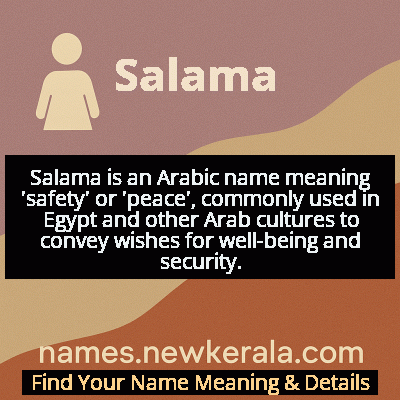Salama Name Meaning & Details
Origin, Popularity, Numerology Analysis & Name Meaning of Salama
Discover the origin, meaning, and cultural significance of the name SALAMA. Delve into its historical roots and explore the lasting impact it has had on communities and traditions.
Name
Salama
Gender
Female
Origin
Egyptian
Lucky Number
2
Meaning of the Name - Salama
Salama is an Arabic name meaning 'safety' or 'peace', commonly used in Egypt and other Arab cultures to convey wishes for well-being and security.
Salama - Complete Numerology Analysis
Your Numerology Number
Based on Pythagorean Numerology System
Ruling Planet
Moon
Positive Nature
Diplomatic, friendly, artistic, empathetic.
Negative Traits
Over-sensitive, moody, indecisive, prone to self-pity.
Lucky Colours
Green, cream, white.
Lucky Days
Monday.
Lucky Stones
Pearl, moonstone.
Harmony Numbers
1, 3, 4.
Best Suited Professions
Diplomats, mediators, caregivers, artists.
What People Like About You
Cooperative spirit, friendliness, artistic talent.
Famous People Named Salama
Salama Moussa
Writer and Intellectual
Pioneering Egyptian writer who promoted socialism and secularism
Salama al-Gamal
Quran Reciter
Renowned Egyptian Quran reciter known for his distinctive melodic style
Salama Ahmed Salama
Journalist
Influential Egyptian journalist and columnist for Al-Ahram newspaper
Salama Abu Gheit
Religious Scholar
Prominent Egyptian Islamic scholar and preacher
Name Variations & International Equivalents
Click on blue names to explore their detailed meanings. Gray names with will be available soon.
Cultural & Historical Significance
Extended Personality Analysis
Individuals bearing the name Salama are typically characterized by their exceptional emotional intelligence and natural diplomatic abilities. They possess an innate capacity for creating harmonious environments and often serve as peacemakers in their social circles. Their calm demeanor masks a strong inner resilience, allowing them to navigate life's challenges with remarkable composure. Salamas are often deeply intuitive, able to understand unspoken emotions and mediate conflicts before they escalate. They tend to be methodical thinkers who approach problems with careful consideration rather than impulsive reactions. This thoughtful nature makes them excellent counselors, teachers, and community leaders. Their peaceful disposition doesn't indicate passivity but rather a conscious choice to respond to situations with wisdom rather than emotion. Family and friends often describe Salamas as the 'anchor' in relationships - reliable, steady, and capable of providing emotional stability during turbulent times. Their presence typically has a calming effect on others, making them natural leaders in group settings.
Modern Usage & Popularity
In contemporary naming practices, Salama maintains a respected position as a traditional Egyptian name with growing cross-cultural appeal. While its usage remains most concentrated in Egypt and other Arabic-speaking countries, globalization has introduced the name to international audiences who appreciate its beautiful meaning and melodic pronunciation. Current trends show moderate but consistent usage, particularly among families seeking names with cultural heritage and positive connotations. The name has gained some popularity among educated urban families in Egypt who value both tradition and meaningful nomenclature. Social media platforms and international mobility have contributed to its gradual spread beyond traditional Arabic-speaking communities. Interestingly, the name's universal message of peace resonates strongly in our interconnected world, making it an attractive choice for multicultural families. While not experiencing dramatic spikes in popularity, Salama enjoys steady usage that suggests enduring appeal rather than fleeting fashion, positioning it as a classic choice that transcends temporary naming trends.
Symbolic & Spiritual Meanings
Symbolically, Salama represents the profound human yearning for wholeness and spiritual completeness. Beyond its literal meaning of 'peaceful,' the name embodies the concept of tahaarah (purity) and spiritual integrity in Islamic philosophy. It symbolizes the journey from fragmentation to unity - both within the individual soul and in human relationships. The name serves as a living reminder that true peace emerges from alignment with divine will and ethical living. In Egyptian cultural symbolism, Salama represents the Nile's life-giving waters - a source of sustenance and harmony in the desert landscape. Metaphorically, it signifies the inner sanctuary that remains undisturbed by external chaos, the quiet center from which strength and wisdom flow. The name also carries connotations of protection and safety, evoking the image of a sheltered harbor in stormy seas. In contemporary context, Salama has come to symbolize the bridge between traditional values and modern aspirations, representing the possibility of maintaining cultural identity while embracing global citizenship and universal human values.

